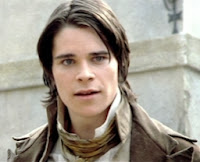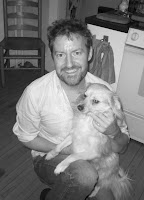 Earlier this evening I watched the first part of the second series of The Tudors.
Earlier this evening I watched the first part of the second series of The Tudors.I’m talking, of course, about Showtime’s hit series that stars Jonathan Rhys Meyers as King Henry VIII, Jeremy Northam as Thomas More, Natalie Dormer as Anne Boleyn, Maria Doyle Kennedy as Katherine of Aragon, and Peter O’Toole as Pope Paul III.
To be honest, I watched it solely because one my favorite actors, Hans Matheson, plays Thomas Cranmer, the Archbishop of Canterbury.
Shallow or what?
Anyway, here’s how Wikipedia describes Thomas Cranmer:
[As Archbishop of Canterbury] during the reigns of the English kings Henry VIII and Edward VI, [Cranmer] was an influential theologian who, with Richard Hooker and Matthew Parker, was a co-founder of Anglican theological thought.
He helped build a favorable case for Henry’s divorce from Katherine of Aragon and guided the English Reformation, which denied papal authority over the English Church, during its earliest days. Following Henry’s death, Cranmer became a key figure in Edward’s regency government.
Scholars credit Cranmer with writing and compiling the first two Books of Common Prayer, which established the basic structure of Anglican liturgy for more than four centuries.
. . . Cranmer was executed in 1556 for heresy after Queen Mary I reunited the Church of England with the Roman Catholic Church. Anglican culture, particularly the literature of John Foxe, later celebrated Cranmer as a martyr. His impact on religion in the United Kingdom was profound and lasting.
. . . [Nevertheless] the subservience with which Cranmer met Henry’s uncontrolled demands, as well as the timorousness which made him sell out his friends and be complicit in acts of intolerance and religious violence, are scars on his legacy. Nevertheless, it was largely due to Cranmer that the Church of England emerged from the English Reformation retaining the ancient Christian faith and the Apostolic Succession, which had largely been lost by continental Protestants. Cranmer is commemorated by the Church of England on March 21. The Episcopal Church in the United States of America commemorates him with the other Oxford martyrs on October 16.
In The Catholic Church: A Short History, Hans Küng notes the following about the English Reformation and the role of Thomas Cranmer:
Henry VIII’s Reformation in England was quite certainly not just a matter of a divorce, as the Catholic side often describes it, nor was it a popular movement as in Protestant Germany. Above all it was a decision of Parliament, carried through by the king. Instead of the pope, the king (and under him the Archbishop of Canterbury) was now the supreme head of the Church of England. That meant a break with Rome, but not with the Catholic faith.
Moreover the Anglican state church did not become Protestant in its life and constitution, after the German model. Only after Henry’s death did the learned archbishop of Canterbury Thomas Cranmer carry through what no bishop in Germany had succeeded in doing: a Reformation which maintained the Episcopal constitution.
Specifically, says Küng:
• There was a simplified and concentrated liturgy in the spirit of the Bible and the early church (Book of Common Prayer, 1549).
• There was a traditional confession of faith with an evangelical doctrine of justification and a Calvinist doctrine of the Eucharist (which was later toned down) (Forty-Two Articles, 1552).
• There was a reform of discipline, but without giving up the traditional structures of ministry.
Concludes Küng:
After the years of the bloody Catholic reaction of Mary Tudor (Archbishop Cranmer, too, went to the stake), under Mary’s half-sister, Elizabeth I (1558-1603), a definitive form of that reformed Catholicism was achieved which in a typically English way combined the medieval and the Reformation paradigms of Christianity. Liturgy and church customs were reformed, but teaching and practice remained Catholic (as laid down in the Thirty-Nine Articles). Hence to the present day the Anglican Church regards itself as the middle way between the extremes of Rome and Geneva.
As perhaps could be expected from a flashy mini-series aimed at the American market, The Tudors plays hard and fast with the facts. Liberties are taken with character names, relationships, physical appearances, and the timing of events.
With regards to papal history, for example, Wikipedia notes the following about the first series:
The papal politics depicted in the first several episodes of the series . . . have no clear relation to actual events. A Pope Alexander is depicted as on his death bed at the time of the Field of the Cloth of Gold meeting between Henry and Francis I of France (in 1520), whereas the actual pope at that time, Leo X, died suddenly at the very end of 1521, and there had not been a pope named Alexander since 1503, before the beginning of Henry’s reign. A Cardinal Orsini is depicted as being elected following the death of the fictional Alexander, which, again, does not correspond to actual history, when the Emperor’s tutor Adrian of Utrecht was elected to succeed Leo, and, following his death just a year later, Cardinal Medici, who as Clement VII would refuse to permit Henry’s divorce, was elected to the papal throne.
I’m sure the second series – the one I’ve just started watching – is also filled with similar historical inaccuracies.
Oh, well, The Tudors mini-series certainly looks good. And Hans Matheson’s performance is, as always, excellent - if frustratingly brief in the installment I watched tonight.
 Oh, and by the way, don’t let those smoldering good looks distract you. The man is a very talented actor. True, he’s not what you would call an “A-list” actor, but that’s definitely part of his appeal to me. Refreshingly, he’s not driven to be a celebrity actor, but rather is dedicated to developing his acting skills through interesting and challenging roles - more often than not in projects that are far from being Hollywood blockbusters.
Oh, and by the way, don’t let those smoldering good looks distract you. The man is a very talented actor. True, he’s not what you would call an “A-list” actor, but that’s definitely part of his appeal to me. Refreshingly, he’s not driven to be a celebrity actor, but rather is dedicated to developing his acting skills through interesting and challenging roles - more often than not in projects that are far from being Hollywood blockbusters.And as you’ll see from many of the images in the following retrospective, long before his portrayal of Thomas Cranmer in The Tudors, Hans Matheson has been portraying various characters from the past – both real and fictitious.

Above: Han’s latest feature film is Bathory. Directed by Juraj Jakubisko, the film tells the story of Countess Elizabeth Bathory, played by Anna Friel. Hans plays the role of Caravaggio, who in this version is rumored to have been Bathory’s lover.
Now, where do you think I could get an outfit like the one Hans is wearing? It’s so cool!

Above: Whereas this outfit I could probably do without: Hans as Mordred in the 2001 TV mini-series, The Mists of Avalon.
When questioned in an interview about whether he thought Mordred was an inherently evil character, Hans responded:
He’s been rejected and abandoned, and that’s what is behind the evil he does. I think that is the case for a lot of people who have been hurt in their lives. Their pain ends up coming out in an indirect way.
Above: Hans in his first major film role: as the heroin addict Eddie in director Coky Giedroyć's 1996 film Stella Does Tricks.
Above and right: Hans as the would-be rock 'n' roll star 'Silver Johnny' in the 1997 film Mojo.
In an article in the July 1998 issue of The Face magazine, it's noted that:
[Hans] first played pubescent Fifties rocker Silver Johnny in the original stage production of Mojo, and has now climbed back into the glittery trousers and junior sized quiff for the film version, in which paedophile gangsters chop each other up just to get their paws on this spring chicken with Elvis hips. The film's writer-director, Jez Butterworth (who has called Matheson "his very own Harvey Keitel") has said that he wrote the part for Hans and the actor concedes to some similarities.
"Like Johnny, I've been through a lot of bad stuff." he says enigmatically. "And we both share that trait which you find in creative people, which is to be continually searching for answers and meanings. I'm not as desperate as I was when I first played him - I used to beat myself up over the slightest mistake. There have been times when I didn't know if I would last. I've done the drugs thing. I've been through all that. I'm not gonna preach just because I'm clean, but I don't think it's good for the soul. I couldn't go back to that now. This is the happiest I've ever been."
Above and left: Hans as Marius Pontmercy in the Bille August-directed 1998 film adaptation of Victor Hugo's 1862 novel Les Misérables. The film also features Liam Neeson, Geoffrey Rush, Uma Thurman, and Claire Danes.
Les Misérables received a 74% "Certified Fresh" rating on Rotten Tomatoes; the consensus states, "This intelligent, handsomely crafted adaptation of Victor Hugo's classic novel condenses the story's developments without blunting its emotional impact."
Above: Hans as the young guitarist Luke Shand in the 1998 film Still Crazy.
Above: Hans as violinist Jeno Varga in the 2000 film Canone Inverso – Making Love.
Above: Hans as Private Jack Hawkstone in the 2002 British horror film Deathwatch.
Above: Hans as the Roman emperor Nero in the 2004 Italian TV mini-series, Imperium: Nero.

Above and below: Hans as the Earl of Essex in the 2005 British TV mini-series, The Virgin Queen. Anne-Marie Duff starred as Queen Elizabeth I.


Above: Hans with Demi Moore in the 2006 feature film (that went straight to DVD in most markets), Half Light, in which he plays lighthouse keeper Angus McCullough. (I wrote about Hans and this particular film in one of my very first Wild Reed posts in May of 2006.)

Above: Hans as Jake in the 2004 British TV movie, Comfortably Numb. This made-for-TV film boldly explores the addiction and rehabilitation process as it follows Jake in his battle to overcome his addiction to alcohol in a specialized treatment center called Promis.
As The Guardian of London notes:
Comfortably Numb is potent and raw, and about more than full-blown addicts. It is about the deceptions, delusions and diversions we create to fool ourselves and other people, our sneaky strategies and devious designs. It is based on stories told by members of the supporting cast, none of whom were professional actors and all of whom were counselors and trainee counselors – and therefore recovering addicts – at the real Promis clinic.

Above: Hans as Tomas the stable boy in the 2002 Swedish-Norwegian-Danish film, I Am Dina.
Directed by Ole Bornedal and based on the 1989 book, Dinas bok (Dina’s Book) by Herbjørg Wassmo, the film is reputedly one of the most high-profile in Norwegian movie history.

Above and left: Hans as Yuri Zhivago in the 2003 TV mini-series, Doctor Zhivago, based on the novel by Boris Pasternak.
It was this mini-series, shown on PBS, that first introduced me to Hans Matheson. It’s a decent enough production, although I feel that Keira Knightley is hopelessly miscast as Lara.
In a November 16, 2002 interview with Karen Hockney of The Scotsman Online, Hans remarked:
I found [Pasternak’s] book incredibly poetic and detailed – I could relate to it. I hadn’t seen [David Lean’s 1965 film version] before I auditioned, but when I read the script I saw a fantastic love story. Then I watched the film and thought it was very good. Omar Sharif was fantastic and so was Julie Christie, but it was a completely different story to the book.
[Lean’s] film was groundbreaking in its time but cinema has become more daring in the last ten years. I think [Lean’s] film was limited emotionally and I hope that [with this new version] we are breaking new ground in terms of the emotional barriers. Yury [Zhivago] is a man of great integrity and I feel very strongly about the love he has for Lara and his wife Tonya.
In terms of future projects, Hans will play Alec D’Urberville in the forthcoming BBC production of Thomas Hardy’s novel, Tess of the d’Urbervilles. Gemma Arterton takes the title role of Tess, with filming commencing this month in England.
For more of Hans Matheson at The Wild Reed, see:
To the Lighthouse . . .
A Devilish Turn

Recommended Off-site Link:
Hans Matheson Online

































9 comments:
The notion held in some quarters (I am not talking about here) that associates Cranmer with religious liberty is rather ridiculous from a historical perspective. If one shrinks from the somewhat more limited but still repugnant violence of the reign of Mary I, Cranmer was affiliated with more and worse. And it wasn't just timorousness on his part - he had much of the ideological utopianism of reformers who put ideas before people.
And take "The Tudors" as fiction sprinkled with an occasional fact.
This is a great summary of Hans' work. Good to see you are still appreciating Hans' work. I was very interested to read your background on Thomas Cranmer. I certainly hope there will be more of him in future episodes.
It doesn't look promising for our hopes of seeing "Bathory" - indeed the project itself doesn't fill one with optimism, but things look good for "Tess of the D'Urbervilles". Hopefully, it will be of the calibre of "Doctor Zhivago". I like the look of this Gemma Arterton. I thnk she is a far more capable actress than the over-rated Knightley.
I wish I had HBO - that time in history is very interesting, but I'd watch just for Jeremy Northam :-)
Re Jeremy Northam
You are not missing much. They've made a relatively two-dimensional figure of Thomas More (quite a feat, when you think about it), and it's not intended to be a sexy role in any way.
You're not missing much *history* here.
"The Six Wives of Henry VIII" is much better a somewhat fictionalized costume history, even if it lacks HBOs requisite porn factor. "The Tudors" doesn't even get cultural history right in the way "Rome" did despite mucking around with dramatic license re certain characters.
Crystal and Liam,
Just a point of clarification: The Tudors is a Showtime, not HBO, production.
Peace,
Michael
Right; I forget. The best shows on Showtime were "Huff" and "Dead Like Me" (though I am hopeful about Tracy Ullman's new show)history is merely cladding for sex there. With HBO's decline - with John Adams deputized to stem the tide - it's been harder to distinguish them.
If you wonder why I bother to watch the Tudors - it's because it was one of my major areas of study, and I have a perverse fascination with seeing how wrong they can get it (and record it on the FiOS DVR so I can zip through the boring salacious crap).
If you want a shallow but compelling reason to watch The Tudors: Henry Cavill as Charles Brandon. :))))
Hello, just found your blog and I am pleasantly surprised by your blog and will come back. I know this actor for I know "I am Dina"from the start, that is: from the very first translation of the book by Wassmö into Dutch and off course I read the entire triology, wich is really somber...somber...Then there was the movie and now I have both on dvd and the original soundtrack...
So you attracted my attention
I will look for his other movies and I will return to read more on your blog.
Greetings
Godeliva van Airadone
Post a Comment